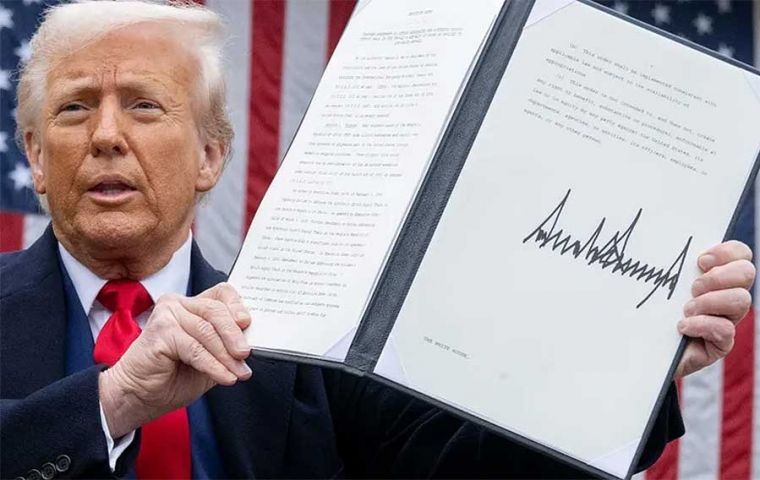MercoPress. South Atlantic News Agency
Trump imposes 25% tariffs on Japan, South Korea, and other countries
 “This 25% number is far less than what is needed to eliminate the Trade Deficit disparity we have,” Trump argued
“This 25% number is far less than what is needed to eliminate the Trade Deficit disparity we have,” Trump argued US President Donald Trump announced new tariffs of at least 25% on most goods imported from 14 nations, including Japan and South Korea, effective August 1. These tariffs are part of his “Make America Wealthy Again” initiative, aimed at reducing trade deficits and boosting domestic manufacturing.
Japan and South Korea will face a 25% duty. Other nations receiving increased tariffs include Malaysia and Kazakhstan (25%), South Africa (30%), Myanmar and Laos (40%), Bangladesh (37%), Cambodia and Thailand (36%), Serbia (35%), Indonesia (32%), Bosnia and Herzegovina (30%), and Tunisia (25%).
Trump had previously set a July 9 deadline for reciprocal tariffs, which he announced on April 2. This new executive order delays the implementation of these duties until August 1.
“Goods transshipped to evade a higher Tariff will be subject to that higher Tariff,” Trump also warned, regarding the possible practice of moving goods to a third country before their final shipment to the United States.
Following the announcement, US stock markets tumbled, with the Dow Jones Industrial Average, S&P 500, and Nasdaq Composite all declining significantly. US-listed Japanese automakers like Toyota, Nissan, and Honda saw notable drops in their stock prices.
Trump stated that these higher tariffs were necessary because these nations were taking advantage of the United States, and that the 25% rate is “far less than what is needed to eliminate the Trade Deficit disparity.”
The letters sent to foreign leaders warn against retaliatory tariffs, stating that any such actions would result in further increases. Trump also encouraged companies to build or manufacture products within the United States to avoid tariffs, promising quick approvals. White House press secretary Karoline Leavitt said more letters will be sent, while USA Today reported that as many as 100 letters could go out soon.
The Republican leader also threatened an additional 10% tariff on nations supporting BRICS (Brazil, Russia, India, and China), with India facing a 26% reciprocal tariff and Brazil a 10% tariff.
The Republican administration has announced trade deals with Great Britain, China, and Vietnam, which include specific tariff rates and exemptions.
In 2024, the US had significant trade deficits with Japan (US$68.5 billion) and South Korea (US$66 billion). However, economists fear that these protectionist measures could lead to product shortages and inflation in the US.
In addition, Trump's authority to impose tariffs through an economic emergency is currently under legal challenge, with a US Court of International Trade ruling suggesting he overstepped his competence.
Critics also questioned the strategic benefit of imposing tariffs on key Asian partners like Japan and South Korea, particularly given their importance in countering China's economic influence.
The three weeks before the tariffs take effect are expected to be a period of intense, possibly “tempestuous,” talks, although some experts are skeptical that meaningful deals can be reached in such a short timeframe.
This move marks a continuation of Trump's aggressive trade policies, signaling a period of ongoing uncertainty in global trade relations.
“Please understand this 25% number is far less than what is needed to eliminate the Trade Deficit disparity we have with your Country,” Trump wrote to the foreign governments affected by the measure. “These Tariffs may be modified, upward or downward, depending on our relationship with your Country. You will never be disappointed with the United States of America.”




Top Comments
Disclaimer & comment rulesCommenting for this story is now closed.
If you have a Facebook account, become a fan and comment on our Facebook Page!